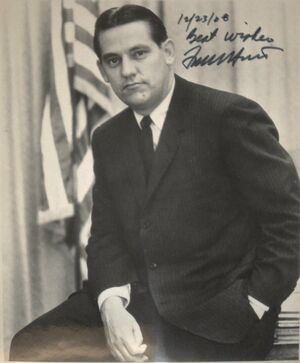Fred Harris
( lawyer, politician) | ||||||||||||||
|---|---|---|---|---|---|---|---|---|---|---|---|---|---|---|
 | ||||||||||||||
| Born | Fred Roy Harris November 13, 1930 Walters, Oklahoma, USA | |||||||||||||
| Died | November 23, 2024 (Age 94) | |||||||||||||
| Nationality | US | |||||||||||||
| Alma mater | University of Oklahoma | |||||||||||||
| Children | • Kathryn Harris • Byron Harris • Laura Harris | |||||||||||||
| Spouse | LaDonna Harris | |||||||||||||
| Party | Democratic | |||||||||||||
US politician who attended the 1966 Bilderberg meeting and was considered as running mate for presidential nominee Hubert Humphrey in 1968. Later supported disbanding the Central Intelligence Agency.
| ||||||||||||||
Fred R. Harris was a US politician from Oklahoma. A member of the Democratic Party, he sat in the United States Senate from 1964 to 1973.[1] He attended the 1966 Bilderberg meeting and was considered as running mate for presidential nominee Hubert Humphrey in 1968.
Education
Harris attended the University of Oklahoma (OU) on a scholarship, graduating in 1952 with a bachelor's degree in history and political science.[2] He then entered the OU law school, where he was administrative assistant to the dean and successively book editor and managing editor of the Law Review. The August 1956 issue contained his first published article. He received the LL B. degree and was admitted to the bar in 1954.[3]
Career
Harris was elected to the Oklahoma Senate in 1956 and served in it until 1964. For most of that time, he was one of its youngest members. During his tenure he introduced legislation to prohibit race discrimination in state employment.[2] He made an unsuccessful bid for governor of Oklahoma in 1962, which made him better known throughout the state.[4]
In 1964, Harris ran to take the remainder of the Senate term of Robert S. Kerr, who had died in office. Harris firmly supported President Johnson's Great Society programs, which were often unpopular in Oklahoma.[2] In July 1967, Johnson appointed Harris to the Kerner Commission, to investigate the causes of over 150 riots throughout the country in 1967 and to provide recommendations that would prevent them from reoccurring.[4]
Harris briefly chaired the Democratic National Committee, preceded and succeeded in that position by Larry O'Brien.[4] He was one of the final two candidates presidential nominee Hubert Humphrey considered as his running mate in 1968; Humphrey ultimately chose U.S. Senator Edmund Muskie.[5] According to O'Brien, Humphrey vacillated between the two until finally choosing Muskie at the last minute. Harris broke with Johnson and Humphrey over the Vietnam War.[3]
Harris did not seek another Senate term in 1972 and instead ran for president, but failed to attract support and ended his campaign after only 48 days.[2] He ran again four years later; both his campaigns were populist and centered on what he called "economic democracy".[2][6] He also supported disbanding the Central Intelligence Agency.[4]To keep expenses down, he traveled the country in a recreational vehicle and stayed in private homes, giving his hosts a card redeemable for one night's stay in the White House upon his election.[7] He emphasized issues affecting Native Americans and the working class. With the best result a surprising fourth-place finish in the 1976 Iowa caucuses, he suspended his campaign on April 8, 1976.[7]
Harris left electoral politics for academia after 1976. He became a professor of political science at the University of New Mexico and wrote many books on political subjects,[3] including Potomac Fever and Deadlock or Decision: The U.S. Senate and the Rise of National Politics. In 2003, Harris was elected to the Common Cause National Governing Board.
Harris remained active well into his final years. In a 2023 interview, he expressed support for President Joe Biden, saying concerns about Biden's age were unfounded.[8]
Event Participated in
| Event | Start | End | Location(s) | Description |
|---|---|---|---|---|
| Bilderberg/1966 | 25 March 1966 | 27 March 1966 | Germany Wiesbaden Hotel Nassauer Hof | Top of the agenda of the 15th Bilderberg in Wiesbaden, Germany, was the restructuring of NATO. Since this discussion was held, all permanent holders of the position of NATO Secretary General have attended at least one Bilderberg conference prior to their appointment. |
References
- ↑ https://www.senate.gov/senators/Biographical/former_senators_state.htm
- ↑ Jump up to: a b c d e https://www.washingtonpost.com/obituaries/2024/11/23/fred-harris-senator-oklahoma-kerner-dead/
- ↑ Jump up to: a b c https://www.okhistory.org/publications/enc/entry.php?entry=HA033
- ↑ Jump up to: a b c d https://www.nytimes.com/2024/11/23/us/politics/fred-r-harris-dead.html
- ↑ Theodore H. White, The Making of the President 1968, New York: Atheneum Publishers, 1969, p.355-356
- ↑ https://www.nytimes.com/1975/01/12/archives/fred-harris-seeks-presidency-mccarthy-runs-as-independent-harris-is.html
- ↑ Jump up to: a b https://www.nytimes.com/1976/04/09/archives/harris-quits-active-role-in-presidential-campaign.html%7Ctitle = Harris Quits Active Role In Presidential Campaign
- ↑ https://sandovaldemocrats.org/optimism-with-action-makes-it-happen-an-interview-with-sen-fred-harris/